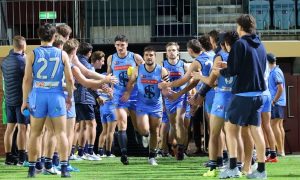Presented by: Festival D’Aix-En-Provence with Adelaide Festival, Opera National De Lyon and Komische Opera Berlin in association with Adelaide Symphony Orchestra.
Reviewed 6 March 2022
Oscar Wilde said, “Life imitates art far more than art imitates life”. This quote sat at the forefront of my mind throughout the Adelaide Festival’s headlining opera, The Golden Cockerel. With recent events unfolding over in Europe, an opera about a Russian Tsar invading neighbouring countries certainly gave this production a fresh and new take. This production of The Golden Cockerel is an absolute visual and aural feast; the melding of music, clever staging, costume and movement throughout this production is sensational.
Originally a poem, The Tale Of The Golden Cockerel, written by Alexander Pushkin in 1834, was the basis of Rimsky-Korsakov’s last opera before his death in 1908. Russian composer Rimsky-Korsakov, along with librettist Vladimir Belsky, wrote the opera in protest of his country’s war against Japan, but due to Government censorship at the time, Rimsky-Korsakov never saw the opera performed. It tells the story of the fictitious Tsar Dodon who thinks that his country is in danger and reaches out for advice from an astrologer, who supplies the Tsar with a magic Golden Cockerel to protect him. The cockerel confirms the Tsar’s fears and the leader pre-emptively attacks a neighbouring country with an army led by his sons.
This opera packs as much of a punch today as it undoubtedly did back when it was first performed in 1909. Not only do the themes throughout the opera resonate with truth in regards to the actions happening across the globe between Russia and Ukraine, there is also a strong connection to these themes within the cast. Ukrainian singer Pavlo Hunka, who is playing the Tsar, gives a very deep and emotional performance, as do the other Ukrainian and Russian company members.
Rimsky-Korsakov was a master of orchestration. He had a magical ability to pass the melody around an orchestra to create heavenly orchestral harmonies. His talent for writing for voices is also clearly apparent throughout The Golden Cockerel. There are many aural delights throughout the work where vocal harmonies and orchestral accompaniment blend so perfectly, then transport you to another place. The Golden Cockerel score was played brilliantly by the Adelaide Symphony Orchestra under the ever watchful eye of Maestro Arvo Volmer. As always, the ASO worked seamlessly together and handled Rimsky-Korsakov’s challenging score with ease (or at least made it sound that way). Volmer has a longstanding relationship with the ASO and his emotive connection to the score made it clear why he returns regularly to conduct these challenging works.
Direction by Barrie Kosky was innovative and fresh. Set in an eery, hilled grassland, with a single skeleton-like tree on which the Golden Cockerel perched, Rufus Didwiszus’s stage design enhanced Kosky’s direction, ably supported through creative costuming by Vitoria Benr and choreography by Otto Pichler. Kosky found great moments of joy, heart-ache, comedy, passion and fear.
The principal cast, Pavlo Hunka (Tsar Dodon), Venera Gimadieva (Queen of Chemakha), Andrei Popov (Astrologer), Samuel Dandas (Tsarevich Aphron), Nicholas Jones (Tsarevich Gvidon), Mischa Schelomianski (Polkan), Samantha Clarke (Golden Cockerel’s Voice) and Matthew Whittet (On stage Cockerel), all gave exquisite performances. However, Hunka, Gimadieva and Popov’s performances pushed this opera into a league of its own. Their voices were velvet, both in their solo work and when singing together. Popov’s upper register was incredibly pure and natural, as was Gimadieva.
The Adelaide Festival Chorus, under the expert eye of Chorus Master Anthony Hunt was as expected: brilliant. Although often appearing as voices on stage, or hidden under giant horse heads and black shrouds, their vocal work was sublime.
Throughout this production there were moments of brilliant lighting, designed by Franck Evin. In these moments, the design perfectly accompanied the on stage direction and was very unobtrusive. However, there were a lot of moments where patches of darkness across the stage caused principals to be lost as they moved around. There were also several times where the front wash was so dim that you could barely make out who was singing and where they were singing from. One other little directorial niggle that halted the flow of the show was the use of Astrologer crossing the stage between the acts. It felt unnecessary, and the use of the curtain and house lights to 25% would have been more suitable.
Putting these minor niggles aside, The Golden Cockerel is two hours (no interval) of pure joy, heart-ache and brilliance. To sit there and listen to this work be performed so expertly was a very moving, emotional experience. Whilst ticket prices are expensive, it’s not every day that a work like this is seen here in Adelaide.
The Golden Cockerel has 2 final performances as part of the 2022 Adelaide Festival – Tuesday 8 and Wednesday 9 March at 6pm. Tickets through Adelaide Festival or at https://www.adelaidefestival.com.au/events/the-golden-cockerel/ .
Reviewed by: Ben Stefanoff
Twitter: @theartsislife
Venue: Festival Theatre, Adelaide Festival Centre
Season: Tuesday 8 and Wednesday 9 at 6pm
Duration: 2 hours, no intermission
Tickets: From $120
Bookings: https://www.adelaidefestival.com.au/events/the-golden-cockerel/
Rating out of 5: 5
Photo Credit: Andrew Beveridge
#Adelaide #AdlFest #AdelaideFestival #livetheatreadelaide #supportthearts





















